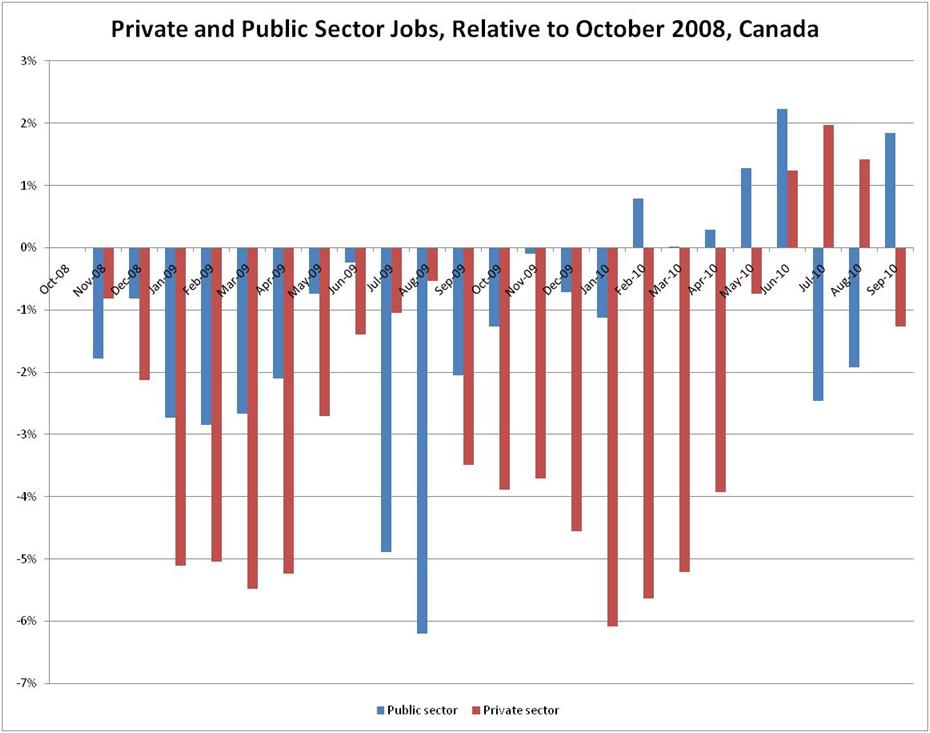Economy Lab at the Globe and Mail
Here’s my take on Canada’s jobs recovery, written for the Economy Lab.
The Economy Lab is a new on-line feature of the on-line business section of the Globe and Mail, part the newspaper’s extensive print and electronic make-over launched on October 1.
Editor Rob Gilroy has made it a lively spot. The Daily Mix is full of links to interesting readings, There are short pieces from the Globe’s stable of high-octane reporters, And they’ve started a brand new section of daily pieces from a wide array of Canadian economists.
I’ve been asked to be a regular contributor. This website will of course provide grist for the mill. But I also invite suggestions from you, dear reader, for topics you think should be brought to the attention of this diverse audience.
The full text of my Economy Lab article is below, but you should check out their site if you haven’t already.
The Harper government loves to refer to Canada’s post-recession track record with the phrase “we’re punching above our weight.â€
If only it were true.
When it comes to the true measure of recovery – jobs – Canada is not punching above its weight. In fact, we’re still waiting for a meaningful private-sector-led full-time jobs recovery.
Between October, 2008, and July, 2009, the Canadian labour market lost a stunning 503,000 full-time jobs and a total of 588,000 permanent jobs. That’s worse than any rate of job loss in a nine-month period since before the Second World War.
This week’s economic and fiscal update by Finance Minister Jum Flaherty trumpeted “All of the jobs lost during the recession in Canada have now been recouped.â€
Reality check: Compared to October, 2008, Canadians are still short 224,000 permanent jobs and 162,000 full-time jobs.
There are only about 60,000 more public sector jobs than two years ago, and while private sector job creation showed some momentum this past summer, that has since dissipated.

As the chart shows, the pool of private sector jobs is still down by 140,000 compared to October 2008. The types of jobs have changed too.
Canada’s job recovery has been fuelled by self-employment, temporary work (contract, seasonal and casual work), and part-time positions — three categories which, together, are called precarious employment by labour economists.
As of September 2010 almost four in 10 Canadian jobs (37.6 per cent) were precarious. These jobs are here today, gone tomorrow. They provide unpredictable income streams even when you are working – hardly the foundation for a sturdy recovery.
Today, more than half of Canada’s 1.5 million unemployed (55 per cent) can’t access jobless benefits, and many Canadians will lose their homes if they encounter a big a drop in income.
This should be a red flag for governments, which have, thus far, played a critical role in stabilizing the labour market as the private sector caved in. Now many of them are eyeing cuts and work force attrition to balance their own books.
Until the private sector recovery finds its legs and starts hiring people under less-tentative terms, governments should not cut spending, and jobs. It may actually put the books into worse shape, both public and private, since Canadians haven’t been this exposed to the economic risks of joblessness in generations.
Savings rates are at levels last seen in the late 1930s, access to jobless benefits at levels last seen in the early 1940s, and household debt just keeps breaking record after record. Six in ten Canadians say they are living from paycheque to paycheque.
We’d all like to punch above our weight, but when it comes to describing Canada’s job recovery, the analogy falls short.

Great article Armine and I am glad you are getting the opportunity to participate in the globe’s ‘economy lab’.
However, i did happen to notice that Stephen Gordon follow up on my comments in here about the manufacturing decline on one of the articles in the lab. If the lab is going to print such crap as he is writing about that I am not sure it will be much of. ‘lab’.
Come on Gordon what kind of garbage aree you writing these day, you stated thAt the loss of nearly 600,000 jobs in mAnufacturing is not necessarily a bad thing- if people had any doubts that you are idiot, then fear not, they are convinced now. How can a supposed economist in such exposure, make such idiotic statements? Irresponisble, low minded, gutter talk is all i can say to such garbage.
This is great news Armine. As for ideas of what to write about, the Globe should prove an important outlet for your work on family income inequality, and poverty. I doubt they have covered the anti-poverty strategies you have discussed at all. And gendered analysis will be a novel beginning in the paper for sure. Jobs and incomes are still the issues that matter the most to most people, your work will open eyes, count on it.